Influence of Ethics: Driving Business and Organizational Performance
VerifiedAdded on 2023/06/03
|14
|4848
|145
Essay
AI Summary
This essay explores the significant influence of ethics on business and organizational performance, highlighting how ethical practices impact various aspects of a firm's operations. It delves into the major sources of business ethics, including cultural, religious, legal, and philosophical perspectives, and examines key ethical theories such as the rights theory, justice theory, and utilitarianism. The essay emphasizes that ethical considerations are fundamental to leadership styles, employee relations, product quality, and competitive strategies, ultimately determining a firm's success and reputation within its operating environment. Furthermore, it discusses how different ethical frameworks guide decision-making processes and contribute to creating a fair and equitable business environment, fostering long-term sustainability and stakeholder trust. Desklib offers a wide range of similar resources for students.
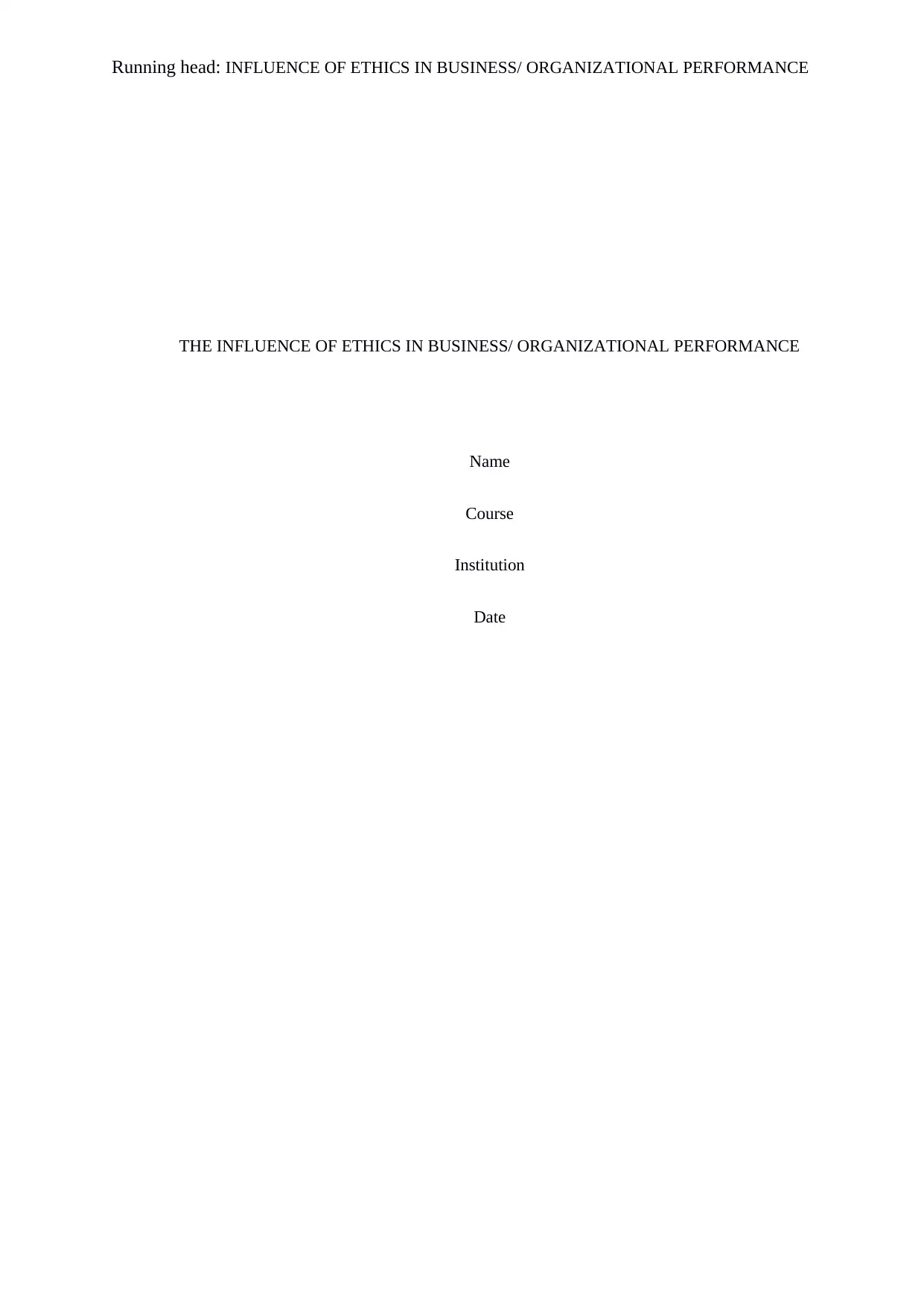
Running head: INFLUENCE OF ETHICS IN BUSINESS/ ORGANIZATIONAL PERFORMANCE
THE INFLUENCE OF ETHICS IN BUSINESS/ ORGANIZATIONAL PERFORMANCE
Name
Course
Institution
Date
THE INFLUENCE OF ETHICS IN BUSINESS/ ORGANIZATIONAL PERFORMANCE
Name
Course
Institution
Date
Paraphrase This Document
Need a fresh take? Get an instant paraphrase of this document with our AI Paraphraser
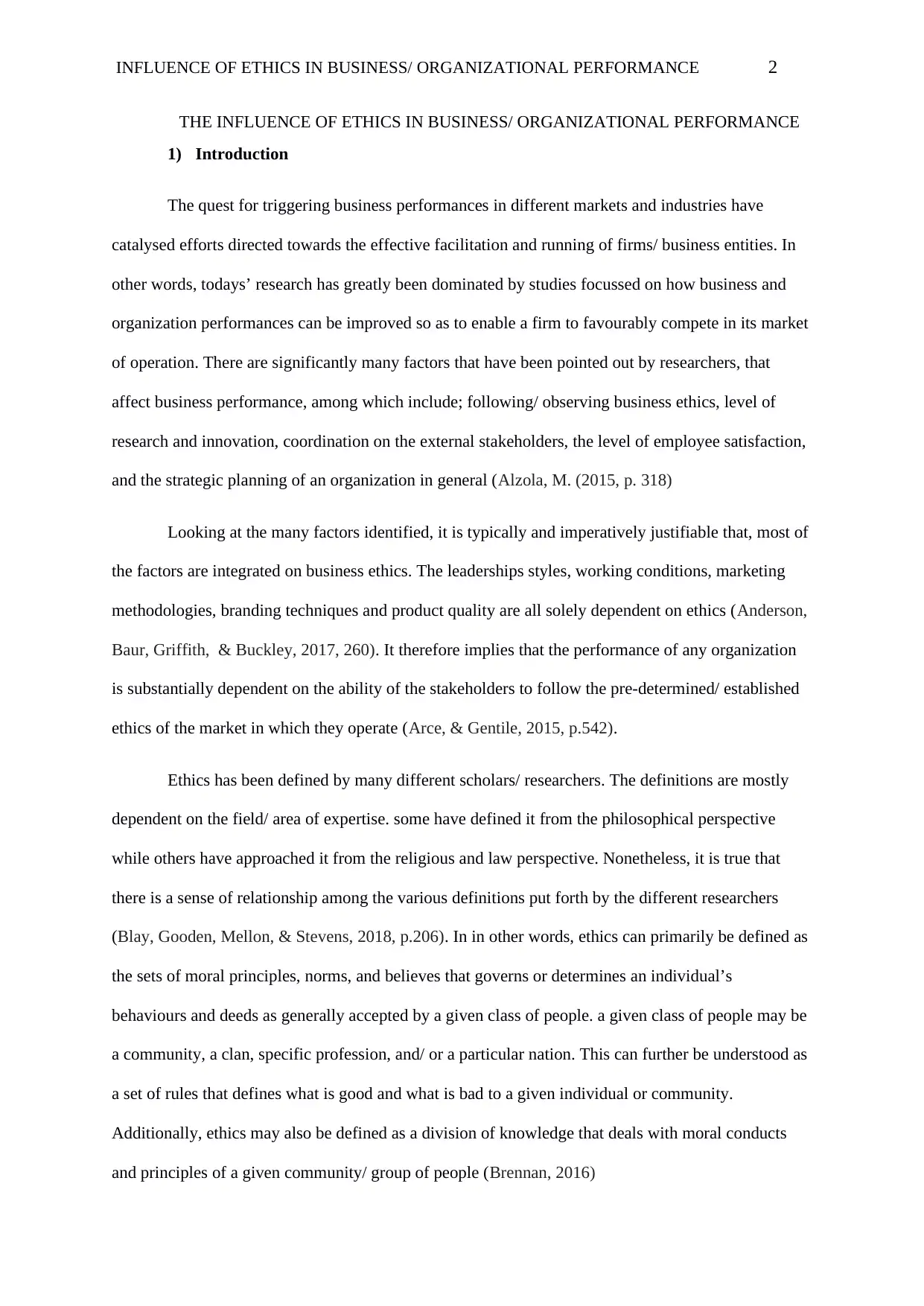
INFLUENCE OF ETHICS IN BUSINESS/ ORGANIZATIONAL PERFORMANCE 2
THE INFLUENCE OF ETHICS IN BUSINESS/ ORGANIZATIONAL PERFORMANCE
1) Introduction
The quest for triggering business performances in different markets and industries have
catalysed efforts directed towards the effective facilitation and running of firms/ business entities. In
other words, todays’ research has greatly been dominated by studies focussed on how business and
organization performances can be improved so as to enable a firm to favourably compete in its market
of operation. There are significantly many factors that have been pointed out by researchers, that
affect business performance, among which include; following/ observing business ethics, level of
research and innovation, coordination on the external stakeholders, the level of employee satisfaction,
and the strategic planning of an organization in general (Alzola, M. (2015, p. 318)
Looking at the many factors identified, it is typically and imperatively justifiable that, most of
the factors are integrated on business ethics. The leaderships styles, working conditions, marketing
methodologies, branding techniques and product quality are all solely dependent on ethics (Anderson,
Baur, Griffith, & Buckley, 2017, 260). It therefore implies that the performance of any organization
is substantially dependent on the ability of the stakeholders to follow the pre-determined/ established
ethics of the market in which they operate (Arce, & Gentile, 2015, p.542).
Ethics has been defined by many different scholars/ researchers. The definitions are mostly
dependent on the field/ area of expertise. some have defined it from the philosophical perspective
while others have approached it from the religious and law perspective. Nonetheless, it is true that
there is a sense of relationship among the various definitions put forth by the different researchers
(Blay, Gooden, Mellon, & Stevens, 2018, p.206). In in other words, ethics can primarily be defined as
the sets of moral principles, norms, and believes that governs or determines an individual’s
behaviours and deeds as generally accepted by a given class of people. a given class of people may be
a community, a clan, specific profession, and/ or a particular nation. This can further be understood as
a set of rules that defines what is good and what is bad to a given individual or community.
Additionally, ethics may also be defined as a division of knowledge that deals with moral conducts
and principles of a given community/ group of people (Brennan, 2016)
THE INFLUENCE OF ETHICS IN BUSINESS/ ORGANIZATIONAL PERFORMANCE
1) Introduction
The quest for triggering business performances in different markets and industries have
catalysed efforts directed towards the effective facilitation and running of firms/ business entities. In
other words, todays’ research has greatly been dominated by studies focussed on how business and
organization performances can be improved so as to enable a firm to favourably compete in its market
of operation. There are significantly many factors that have been pointed out by researchers, that
affect business performance, among which include; following/ observing business ethics, level of
research and innovation, coordination on the external stakeholders, the level of employee satisfaction,
and the strategic planning of an organization in general (Alzola, M. (2015, p. 318)
Looking at the many factors identified, it is typically and imperatively justifiable that, most of
the factors are integrated on business ethics. The leaderships styles, working conditions, marketing
methodologies, branding techniques and product quality are all solely dependent on ethics (Anderson,
Baur, Griffith, & Buckley, 2017, 260). It therefore implies that the performance of any organization
is substantially dependent on the ability of the stakeholders to follow the pre-determined/ established
ethics of the market in which they operate (Arce, & Gentile, 2015, p.542).
Ethics has been defined by many different scholars/ researchers. The definitions are mostly
dependent on the field/ area of expertise. some have defined it from the philosophical perspective
while others have approached it from the religious and law perspective. Nonetheless, it is true that
there is a sense of relationship among the various definitions put forth by the different researchers
(Blay, Gooden, Mellon, & Stevens, 2018, p.206). In in other words, ethics can primarily be defined as
the sets of moral principles, norms, and believes that governs or determines an individual’s
behaviours and deeds as generally accepted by a given class of people. a given class of people may be
a community, a clan, specific profession, and/ or a particular nation. This can further be understood as
a set of rules that defines what is good and what is bad to a given individual or community.
Additionally, ethics may also be defined as a division of knowledge that deals with moral conducts
and principles of a given community/ group of people (Brennan, 2016)
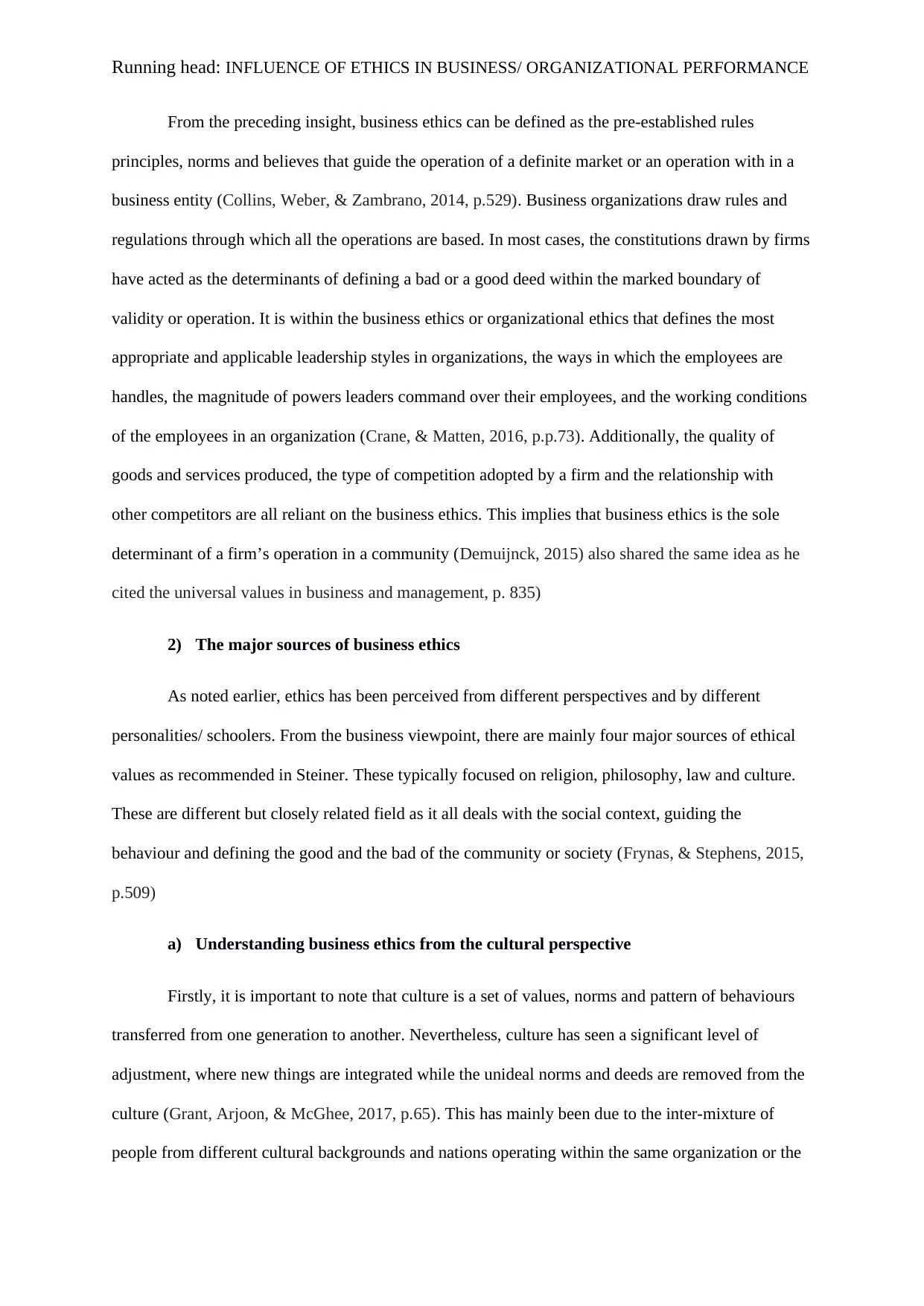
Running head: INFLUENCE OF ETHICS IN BUSINESS/ ORGANIZATIONAL PERFORMANCE
From the preceding insight, business ethics can be defined as the pre-established rules
principles, norms and believes that guide the operation of a definite market or an operation with in a
business entity (Collins, Weber, & Zambrano, 2014, p.529). Business organizations draw rules and
regulations through which all the operations are based. In most cases, the constitutions drawn by firms
have acted as the determinants of defining a bad or a good deed within the marked boundary of
validity or operation. It is within the business ethics or organizational ethics that defines the most
appropriate and applicable leadership styles in organizations, the ways in which the employees are
handles, the magnitude of powers leaders command over their employees, and the working conditions
of the employees in an organization (Crane, & Matten, 2016, p.p.73). Additionally, the quality of
goods and services produced, the type of competition adopted by a firm and the relationship with
other competitors are all reliant on the business ethics. This implies that business ethics is the sole
determinant of a firm’s operation in a community (Demuijnck, 2015) also shared the same idea as he
cited the universal values in business and management, p. 835)
2) The major sources of business ethics
As noted earlier, ethics has been perceived from different perspectives and by different
personalities/ schoolers. From the business viewpoint, there are mainly four major sources of ethical
values as recommended in Steiner. These typically focused on religion, philosophy, law and culture.
These are different but closely related field as it all deals with the social context, guiding the
behaviour and defining the good and the bad of the community or society (Frynas, & Stephens, 2015,
p.509)
a) Understanding business ethics from the cultural perspective
Firstly, it is important to note that culture is a set of values, norms and pattern of behaviours
transferred from one generation to another. Nevertheless, culture has seen a significant level of
adjustment, where new things are integrated while the unideal norms and deeds are removed from the
culture (Grant, Arjoon, & McGhee, 2017, p.65). This has mainly been due to the inter-mixture of
people from different cultural backgrounds and nations operating within the same organization or the
From the preceding insight, business ethics can be defined as the pre-established rules
principles, norms and believes that guide the operation of a definite market or an operation with in a
business entity (Collins, Weber, & Zambrano, 2014, p.529). Business organizations draw rules and
regulations through which all the operations are based. In most cases, the constitutions drawn by firms
have acted as the determinants of defining a bad or a good deed within the marked boundary of
validity or operation. It is within the business ethics or organizational ethics that defines the most
appropriate and applicable leadership styles in organizations, the ways in which the employees are
handles, the magnitude of powers leaders command over their employees, and the working conditions
of the employees in an organization (Crane, & Matten, 2016, p.p.73). Additionally, the quality of
goods and services produced, the type of competition adopted by a firm and the relationship with
other competitors are all reliant on the business ethics. This implies that business ethics is the sole
determinant of a firm’s operation in a community (Demuijnck, 2015) also shared the same idea as he
cited the universal values in business and management, p. 835)
2) The major sources of business ethics
As noted earlier, ethics has been perceived from different perspectives and by different
personalities/ schoolers. From the business viewpoint, there are mainly four major sources of ethical
values as recommended in Steiner. These typically focused on religion, philosophy, law and culture.
These are different but closely related field as it all deals with the social context, guiding the
behaviour and defining the good and the bad of the community or society (Frynas, & Stephens, 2015,
p.509)
a) Understanding business ethics from the cultural perspective
Firstly, it is important to note that culture is a set of values, norms and pattern of behaviours
transferred from one generation to another. Nevertheless, culture has seen a significant level of
adjustment, where new things are integrated while the unideal norms and deeds are removed from the
culture (Grant, Arjoon, & McGhee, 2017, p.65). This has mainly been due to the inter-mixture of
people from different cultural backgrounds and nations operating within the same organization or the
⊘ This is a preview!⊘
Do you want full access?
Subscribe today to unlock all pages.

Trusted by 1+ million students worldwide
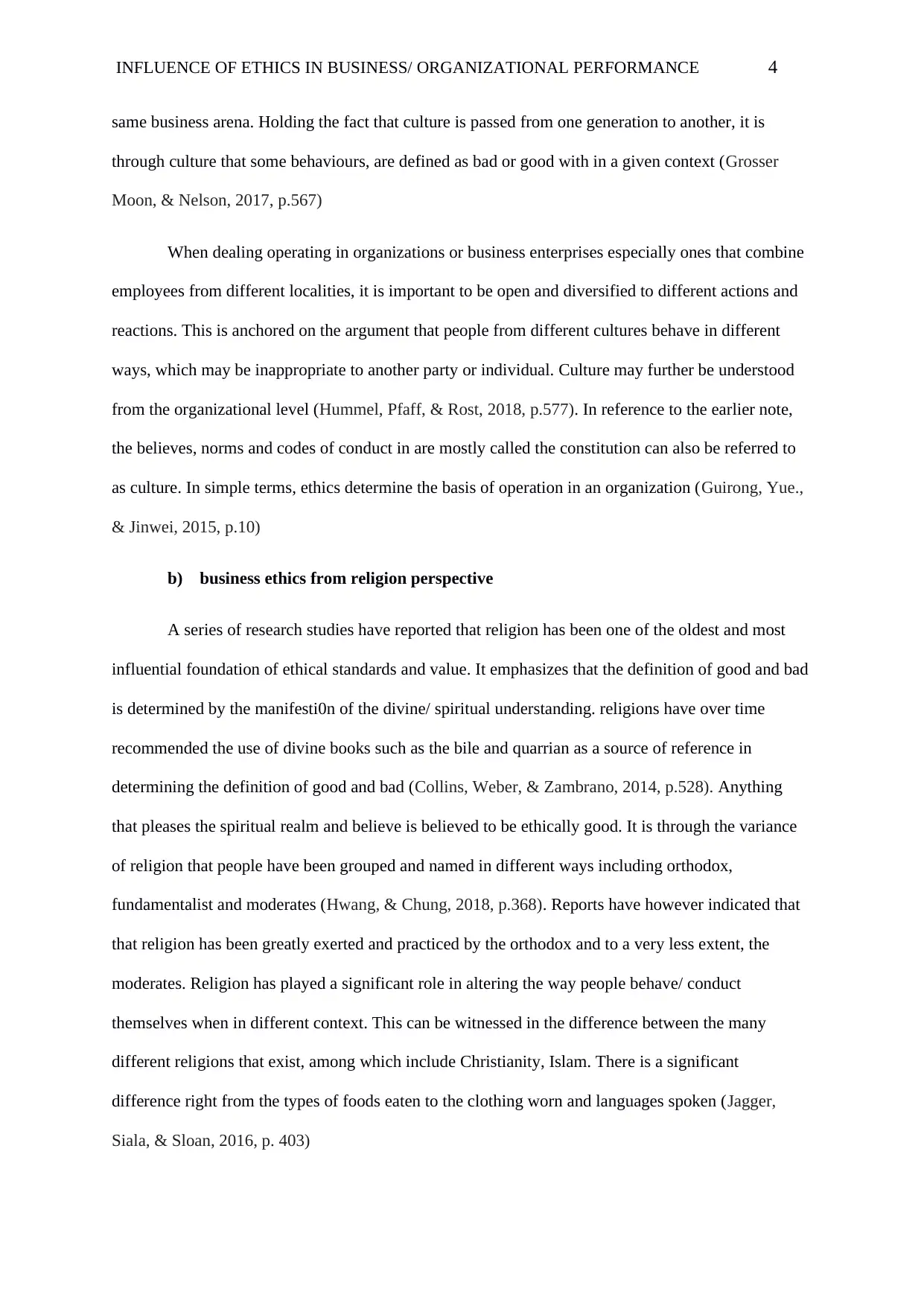
INFLUENCE OF ETHICS IN BUSINESS/ ORGANIZATIONAL PERFORMANCE 4
same business arena. Holding the fact that culture is passed from one generation to another, it is
through culture that some behaviours, are defined as bad or good with in a given context (Grosser
Moon, & Nelson, 2017, p.567)
When dealing operating in organizations or business enterprises especially ones that combine
employees from different localities, it is important to be open and diversified to different actions and
reactions. This is anchored on the argument that people from different cultures behave in different
ways, which may be inappropriate to another party or individual. Culture may further be understood
from the organizational level (Hummel, Pfaff, & Rost, 2018, p.577). In reference to the earlier note,
the believes, norms and codes of conduct in are mostly called the constitution can also be referred to
as culture. In simple terms, ethics determine the basis of operation in an organization (Guirong, Yue.,
& Jinwei, 2015, p.10)
b) business ethics from religion perspective
A series of research studies have reported that religion has been one of the oldest and most
influential foundation of ethical standards and value. It emphasizes that the definition of good and bad
is determined by the manifesti0n of the divine/ spiritual understanding. religions have over time
recommended the use of divine books such as the bile and quarrian as a source of reference in
determining the definition of good and bad (Collins, Weber, & Zambrano, 2014, p.528). Anything
that pleases the spiritual realm and believe is believed to be ethically good. It is through the variance
of religion that people have been grouped and named in different ways including orthodox,
fundamentalist and moderates (Hwang, & Chung, 2018, p.368). Reports have however indicated that
that religion has been greatly exerted and practiced by the orthodox and to a very less extent, the
moderates. Religion has played a significant role in altering the way people behave/ conduct
themselves when in different context. This can be witnessed in the difference between the many
different religions that exist, among which include Christianity, Islam. There is a significant
difference right from the types of foods eaten to the clothing worn and languages spoken (Jagger,
Siala, & Sloan, 2016, p. 403)
same business arena. Holding the fact that culture is passed from one generation to another, it is
through culture that some behaviours, are defined as bad or good with in a given context (Grosser
Moon, & Nelson, 2017, p.567)
When dealing operating in organizations or business enterprises especially ones that combine
employees from different localities, it is important to be open and diversified to different actions and
reactions. This is anchored on the argument that people from different cultures behave in different
ways, which may be inappropriate to another party or individual. Culture may further be understood
from the organizational level (Hummel, Pfaff, & Rost, 2018, p.577). In reference to the earlier note,
the believes, norms and codes of conduct in are mostly called the constitution can also be referred to
as culture. In simple terms, ethics determine the basis of operation in an organization (Guirong, Yue.,
& Jinwei, 2015, p.10)
b) business ethics from religion perspective
A series of research studies have reported that religion has been one of the oldest and most
influential foundation of ethical standards and value. It emphasizes that the definition of good and bad
is determined by the manifesti0n of the divine/ spiritual understanding. religions have over time
recommended the use of divine books such as the bile and quarrian as a source of reference in
determining the definition of good and bad (Collins, Weber, & Zambrano, 2014, p.528). Anything
that pleases the spiritual realm and believe is believed to be ethically good. It is through the variance
of religion that people have been grouped and named in different ways including orthodox,
fundamentalist and moderates (Hwang, & Chung, 2018, p.368). Reports have however indicated that
that religion has been greatly exerted and practiced by the orthodox and to a very less extent, the
moderates. Religion has played a significant role in altering the way people behave/ conduct
themselves when in different context. This can be witnessed in the difference between the many
different religions that exist, among which include Christianity, Islam. There is a significant
difference right from the types of foods eaten to the clothing worn and languages spoken (Jagger,
Siala, & Sloan, 2016, p. 403)
Paraphrase This Document
Need a fresh take? Get an instant paraphrase of this document with our AI Paraphraser
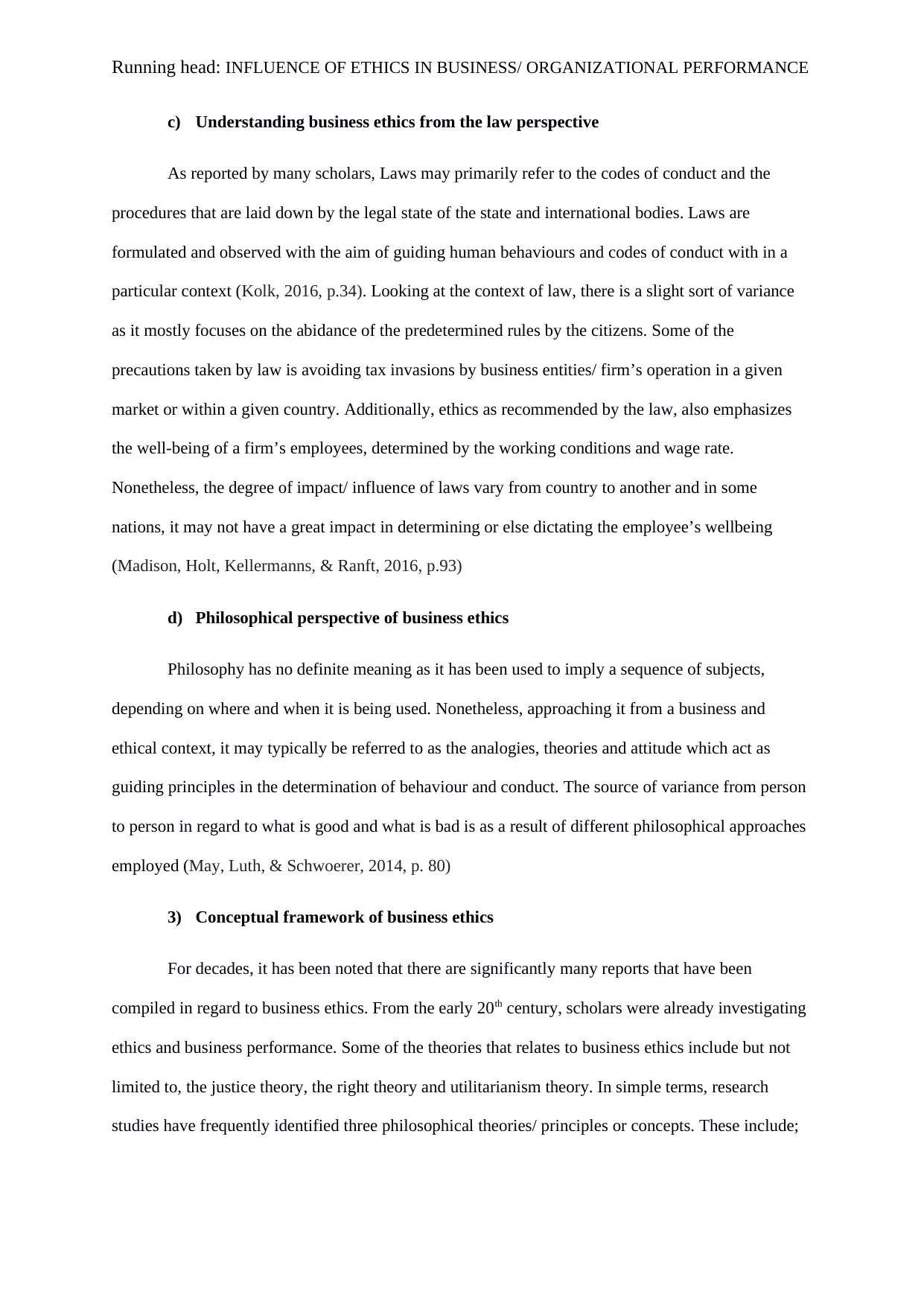
Running head: INFLUENCE OF ETHICS IN BUSINESS/ ORGANIZATIONAL PERFORMANCE
c) Understanding business ethics from the law perspective
As reported by many scholars, Laws may primarily refer to the codes of conduct and the
procedures that are laid down by the legal state of the state and international bodies. Laws are
formulated and observed with the aim of guiding human behaviours and codes of conduct with in a
particular context (Kolk, 2016, p.34). Looking at the context of law, there is a slight sort of variance
as it mostly focuses on the abidance of the predetermined rules by the citizens. Some of the
precautions taken by law is avoiding tax invasions by business entities/ firm’s operation in a given
market or within a given country. Additionally, ethics as recommended by the law, also emphasizes
the well-being of a firm’s employees, determined by the working conditions and wage rate.
Nonetheless, the degree of impact/ influence of laws vary from country to another and in some
nations, it may not have a great impact in determining or else dictating the employee’s wellbeing
(Madison, Holt, Kellermanns, & Ranft, 2016, p.93)
d) Philosophical perspective of business ethics
Philosophy has no definite meaning as it has been used to imply a sequence of subjects,
depending on where and when it is being used. Nonetheless, approaching it from a business and
ethical context, it may typically be referred to as the analogies, theories and attitude which act as
guiding principles in the determination of behaviour and conduct. The source of variance from person
to person in regard to what is good and what is bad is as a result of different philosophical approaches
employed (May, Luth, & Schwoerer, 2014, p. 80)
3) Conceptual framework of business ethics
For decades, it has been noted that there are significantly many reports that have been
compiled in regard to business ethics. From the early 20th century, scholars were already investigating
ethics and business performance. Some of the theories that relates to business ethics include but not
limited to, the justice theory, the right theory and utilitarianism theory. In simple terms, research
studies have frequently identified three philosophical theories/ principles or concepts. These include;
c) Understanding business ethics from the law perspective
As reported by many scholars, Laws may primarily refer to the codes of conduct and the
procedures that are laid down by the legal state of the state and international bodies. Laws are
formulated and observed with the aim of guiding human behaviours and codes of conduct with in a
particular context (Kolk, 2016, p.34). Looking at the context of law, there is a slight sort of variance
as it mostly focuses on the abidance of the predetermined rules by the citizens. Some of the
precautions taken by law is avoiding tax invasions by business entities/ firm’s operation in a given
market or within a given country. Additionally, ethics as recommended by the law, also emphasizes
the well-being of a firm’s employees, determined by the working conditions and wage rate.
Nonetheless, the degree of impact/ influence of laws vary from country to another and in some
nations, it may not have a great impact in determining or else dictating the employee’s wellbeing
(Madison, Holt, Kellermanns, & Ranft, 2016, p.93)
d) Philosophical perspective of business ethics
Philosophy has no definite meaning as it has been used to imply a sequence of subjects,
depending on where and when it is being used. Nonetheless, approaching it from a business and
ethical context, it may typically be referred to as the analogies, theories and attitude which act as
guiding principles in the determination of behaviour and conduct. The source of variance from person
to person in regard to what is good and what is bad is as a result of different philosophical approaches
employed (May, Luth, & Schwoerer, 2014, p. 80)
3) Conceptual framework of business ethics
For decades, it has been noted that there are significantly many reports that have been
compiled in regard to business ethics. From the early 20th century, scholars were already investigating
ethics and business performance. Some of the theories that relates to business ethics include but not
limited to, the justice theory, the right theory and utilitarianism theory. In simple terms, research
studies have frequently identified three philosophical theories/ principles or concepts. These include;
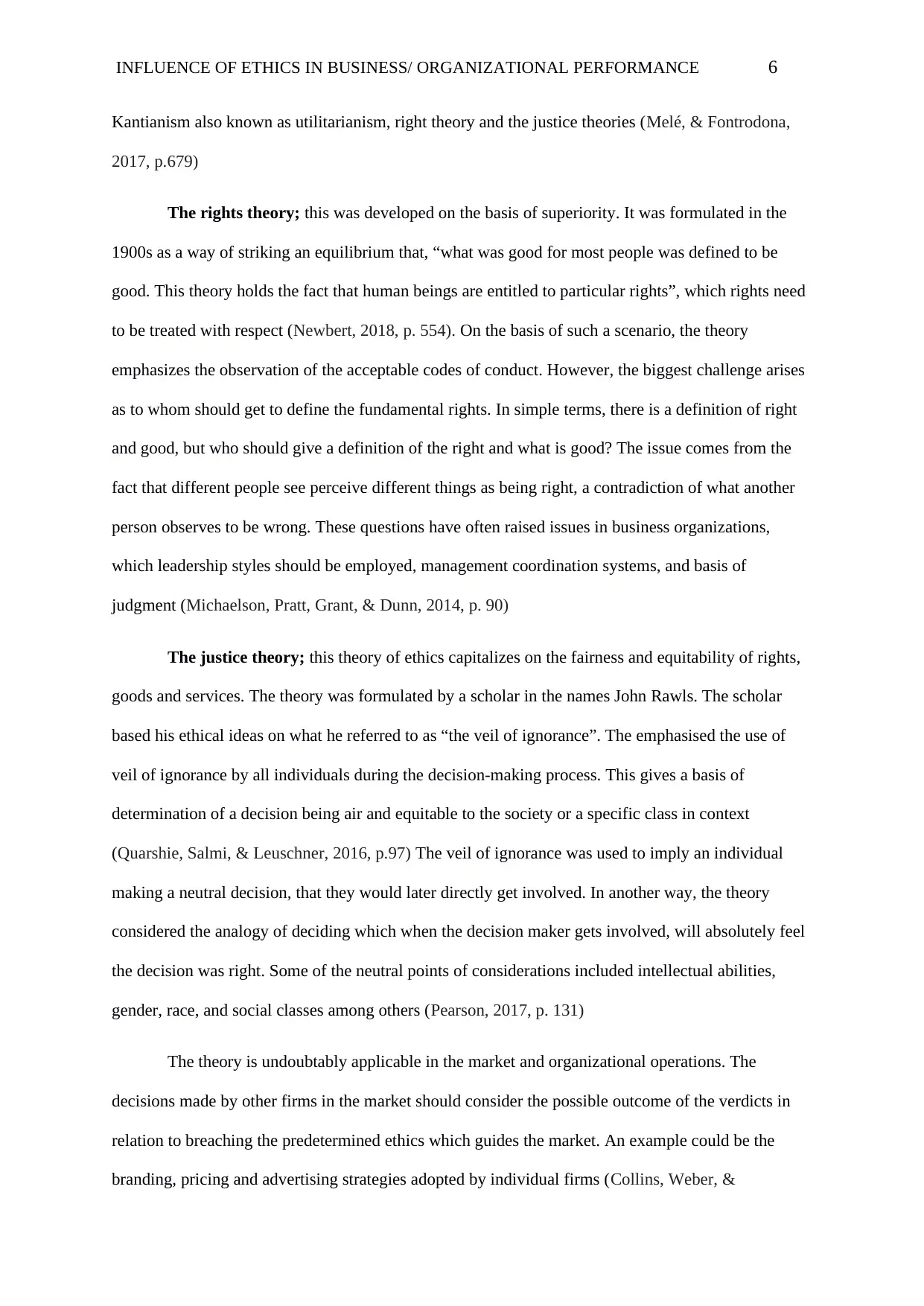
INFLUENCE OF ETHICS IN BUSINESS/ ORGANIZATIONAL PERFORMANCE 6
Kantianism also known as utilitarianism, right theory and the justice theories (Melé, & Fontrodona,
2017, p.679)
The rights theory; this was developed on the basis of superiority. It was formulated in the
1900s as a way of striking an equilibrium that, “what was good for most people was defined to be
good. This theory holds the fact that human beings are entitled to particular rights”, which rights need
to be treated with respect (Newbert, 2018, p. 554). On the basis of such a scenario, the theory
emphasizes the observation of the acceptable codes of conduct. However, the biggest challenge arises
as to whom should get to define the fundamental rights. In simple terms, there is a definition of right
and good, but who should give a definition of the right and what is good? The issue comes from the
fact that different people see perceive different things as being right, a contradiction of what another
person observes to be wrong. These questions have often raised issues in business organizations,
which leadership styles should be employed, management coordination systems, and basis of
judgment (Michaelson, Pratt, Grant, & Dunn, 2014, p. 90)
The justice theory; this theory of ethics capitalizes on the fairness and equitability of rights,
goods and services. The theory was formulated by a scholar in the names John Rawls. The scholar
based his ethical ideas on what he referred to as “the veil of ignorance”. The emphasised the use of
veil of ignorance by all individuals during the decision-making process. This gives a basis of
determination of a decision being air and equitable to the society or a specific class in context
(Quarshie, Salmi, & Leuschner, 2016, p.97) The veil of ignorance was used to imply an individual
making a neutral decision, that they would later directly get involved. In another way, the theory
considered the analogy of deciding which when the decision maker gets involved, will absolutely feel
the decision was right. Some of the neutral points of considerations included intellectual abilities,
gender, race, and social classes among others (Pearson, 2017, p. 131)
The theory is undoubtably applicable in the market and organizational operations. The
decisions made by other firms in the market should consider the possible outcome of the verdicts in
relation to breaching the predetermined ethics which guides the market. An example could be the
branding, pricing and advertising strategies adopted by individual firms (Collins, Weber, &
Kantianism also known as utilitarianism, right theory and the justice theories (Melé, & Fontrodona,
2017, p.679)
The rights theory; this was developed on the basis of superiority. It was formulated in the
1900s as a way of striking an equilibrium that, “what was good for most people was defined to be
good. This theory holds the fact that human beings are entitled to particular rights”, which rights need
to be treated with respect (Newbert, 2018, p. 554). On the basis of such a scenario, the theory
emphasizes the observation of the acceptable codes of conduct. However, the biggest challenge arises
as to whom should get to define the fundamental rights. In simple terms, there is a definition of right
and good, but who should give a definition of the right and what is good? The issue comes from the
fact that different people see perceive different things as being right, a contradiction of what another
person observes to be wrong. These questions have often raised issues in business organizations,
which leadership styles should be employed, management coordination systems, and basis of
judgment (Michaelson, Pratt, Grant, & Dunn, 2014, p. 90)
The justice theory; this theory of ethics capitalizes on the fairness and equitability of rights,
goods and services. The theory was formulated by a scholar in the names John Rawls. The scholar
based his ethical ideas on what he referred to as “the veil of ignorance”. The emphasised the use of
veil of ignorance by all individuals during the decision-making process. This gives a basis of
determination of a decision being air and equitable to the society or a specific class in context
(Quarshie, Salmi, & Leuschner, 2016, p.97) The veil of ignorance was used to imply an individual
making a neutral decision, that they would later directly get involved. In another way, the theory
considered the analogy of deciding which when the decision maker gets involved, will absolutely feel
the decision was right. Some of the neutral points of considerations included intellectual abilities,
gender, race, and social classes among others (Pearson, 2017, p. 131)
The theory is undoubtably applicable in the market and organizational operations. The
decisions made by other firms in the market should consider the possible outcome of the verdicts in
relation to breaching the predetermined ethics which guides the market. An example could be the
branding, pricing and advertising strategies adopted by individual firms (Collins, Weber, &
⊘ This is a preview!⊘
Do you want full access?
Subscribe today to unlock all pages.

Trusted by 1+ million students worldwide
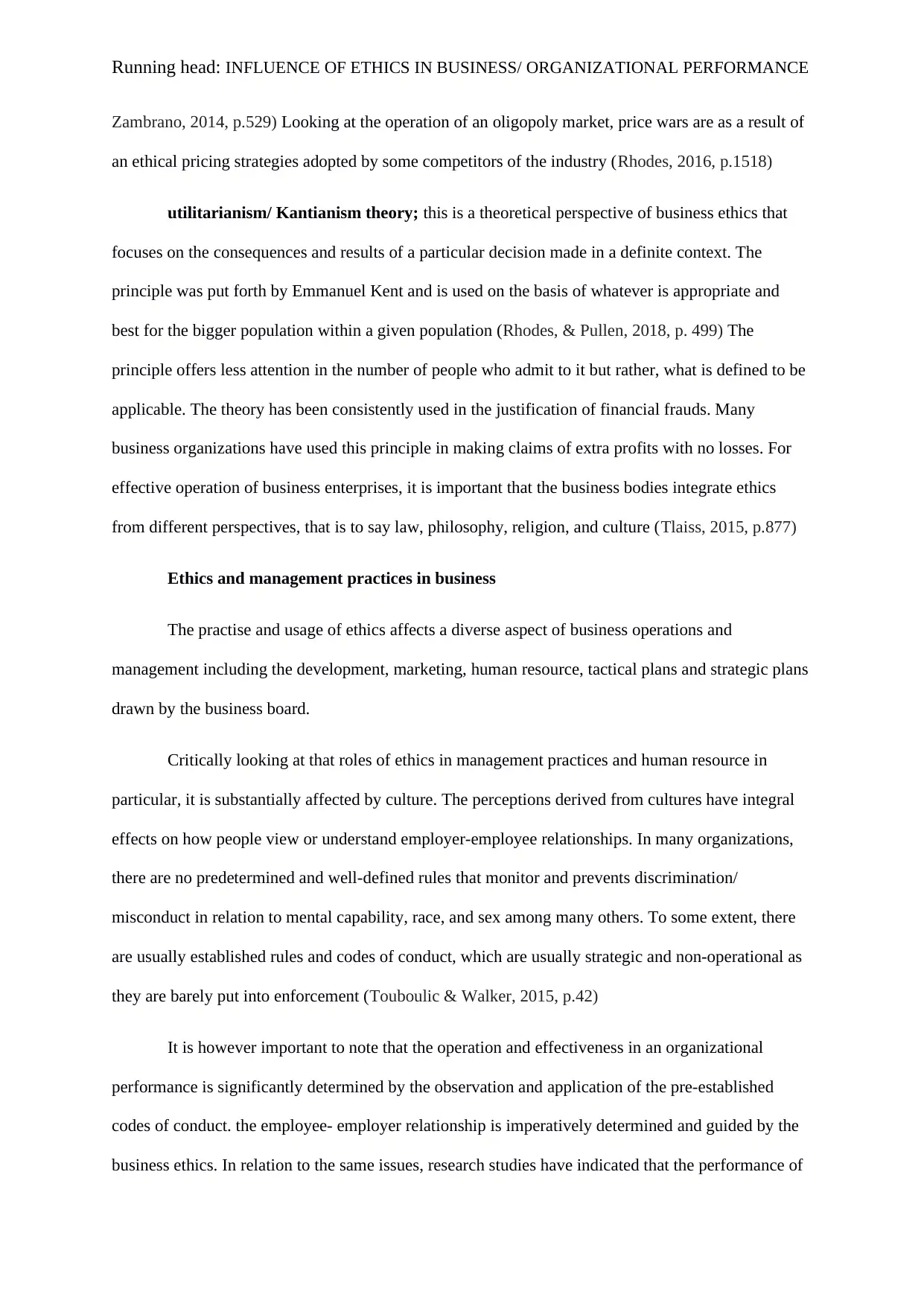
Running head: INFLUENCE OF ETHICS IN BUSINESS/ ORGANIZATIONAL PERFORMANCE
Zambrano, 2014, p.529) Looking at the operation of an oligopoly market, price wars are as a result of
an ethical pricing strategies adopted by some competitors of the industry (Rhodes, 2016, p.1518)
utilitarianism/ Kantianism theory; this is a theoretical perspective of business ethics that
focuses on the consequences and results of a particular decision made in a definite context. The
principle was put forth by Emmanuel Kent and is used on the basis of whatever is appropriate and
best for the bigger population within a given population (Rhodes, & Pullen, 2018, p. 499) The
principle offers less attention in the number of people who admit to it but rather, what is defined to be
applicable. The theory has been consistently used in the justification of financial frauds. Many
business organizations have used this principle in making claims of extra profits with no losses. For
effective operation of business enterprises, it is important that the business bodies integrate ethics
from different perspectives, that is to say law, philosophy, religion, and culture (Tlaiss, 2015, p.877)
Ethics and management practices in business
The practise and usage of ethics affects a diverse aspect of business operations and
management including the development, marketing, human resource, tactical plans and strategic plans
drawn by the business board.
Critically looking at that roles of ethics in management practices and human resource in
particular, it is substantially affected by culture. The perceptions derived from cultures have integral
effects on how people view or understand employer-employee relationships. In many organizations,
there are no predetermined and well-defined rules that monitor and prevents discrimination/
misconduct in relation to mental capability, race, and sex among many others. To some extent, there
are usually established rules and codes of conduct, which are usually strategic and non-operational as
they are barely put into enforcement (Touboulic & Walker, 2015, p.42)
It is however important to note that the operation and effectiveness in an organizational
performance is significantly determined by the observation and application of the pre-established
codes of conduct. the employee- employer relationship is imperatively determined and guided by the
business ethics. In relation to the same issues, research studies have indicated that the performance of
Zambrano, 2014, p.529) Looking at the operation of an oligopoly market, price wars are as a result of
an ethical pricing strategies adopted by some competitors of the industry (Rhodes, 2016, p.1518)
utilitarianism/ Kantianism theory; this is a theoretical perspective of business ethics that
focuses on the consequences and results of a particular decision made in a definite context. The
principle was put forth by Emmanuel Kent and is used on the basis of whatever is appropriate and
best for the bigger population within a given population (Rhodes, & Pullen, 2018, p. 499) The
principle offers less attention in the number of people who admit to it but rather, what is defined to be
applicable. The theory has been consistently used in the justification of financial frauds. Many
business organizations have used this principle in making claims of extra profits with no losses. For
effective operation of business enterprises, it is important that the business bodies integrate ethics
from different perspectives, that is to say law, philosophy, religion, and culture (Tlaiss, 2015, p.877)
Ethics and management practices in business
The practise and usage of ethics affects a diverse aspect of business operations and
management including the development, marketing, human resource, tactical plans and strategic plans
drawn by the business board.
Critically looking at that roles of ethics in management practices and human resource in
particular, it is substantially affected by culture. The perceptions derived from cultures have integral
effects on how people view or understand employer-employee relationships. In many organizations,
there are no predetermined and well-defined rules that monitor and prevents discrimination/
misconduct in relation to mental capability, race, and sex among many others. To some extent, there
are usually established rules and codes of conduct, which are usually strategic and non-operational as
they are barely put into enforcement (Touboulic & Walker, 2015, p.42)
It is however important to note that the operation and effectiveness in an organizational
performance is significantly determined by the observation and application of the pre-established
codes of conduct. the employee- employer relationship is imperatively determined and guided by the
business ethics. In relation to the same issues, research studies have indicated that the performance of
Paraphrase This Document
Need a fresh take? Get an instant paraphrase of this document with our AI Paraphraser
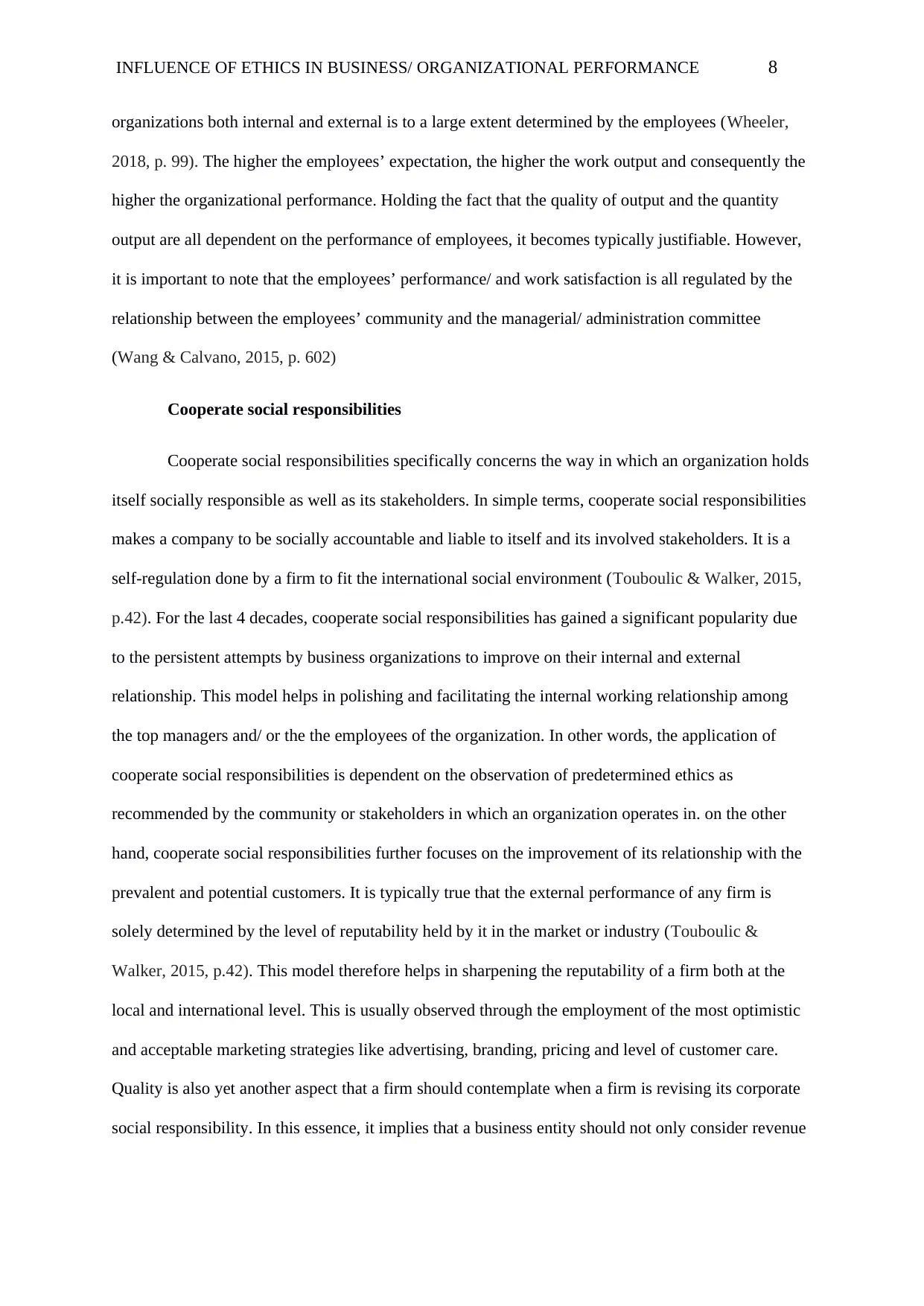
INFLUENCE OF ETHICS IN BUSINESS/ ORGANIZATIONAL PERFORMANCE 8
organizations both internal and external is to a large extent determined by the employees (Wheeler,
2018, p. 99). The higher the employees’ expectation, the higher the work output and consequently the
higher the organizational performance. Holding the fact that the quality of output and the quantity
output are all dependent on the performance of employees, it becomes typically justifiable. However,
it is important to note that the employees’ performance/ and work satisfaction is all regulated by the
relationship between the employees’ community and the managerial/ administration committee
(Wang & Calvano, 2015, p. 602)
Cooperate social responsibilities
Cooperate social responsibilities specifically concerns the way in which an organization holds
itself socially responsible as well as its stakeholders. In simple terms, cooperate social responsibilities
makes a company to be socially accountable and liable to itself and its involved stakeholders. It is a
self-regulation done by a firm to fit the international social environment (Touboulic & Walker, 2015,
p.42). For the last 4 decades, cooperate social responsibilities has gained a significant popularity due
to the persistent attempts by business organizations to improve on their internal and external
relationship. This model helps in polishing and facilitating the internal working relationship among
the top managers and/ or the the employees of the organization. In other words, the application of
cooperate social responsibilities is dependent on the observation of predetermined ethics as
recommended by the community or stakeholders in which an organization operates in. on the other
hand, cooperate social responsibilities further focuses on the improvement of its relationship with the
prevalent and potential customers. It is typically true that the external performance of any firm is
solely determined by the level of reputability held by it in the market or industry (Touboulic &
Walker, 2015, p.42). This model therefore helps in sharpening the reputability of a firm both at the
local and international level. This is usually observed through the employment of the most optimistic
and acceptable marketing strategies like advertising, branding, pricing and level of customer care.
Quality is also yet another aspect that a firm should contemplate when a firm is revising its corporate
social responsibility. In this essence, it implies that a business entity should not only consider revenue
organizations both internal and external is to a large extent determined by the employees (Wheeler,
2018, p. 99). The higher the employees’ expectation, the higher the work output and consequently the
higher the organizational performance. Holding the fact that the quality of output and the quantity
output are all dependent on the performance of employees, it becomes typically justifiable. However,
it is important to note that the employees’ performance/ and work satisfaction is all regulated by the
relationship between the employees’ community and the managerial/ administration committee
(Wang & Calvano, 2015, p. 602)
Cooperate social responsibilities
Cooperate social responsibilities specifically concerns the way in which an organization holds
itself socially responsible as well as its stakeholders. In simple terms, cooperate social responsibilities
makes a company to be socially accountable and liable to itself and its involved stakeholders. It is a
self-regulation done by a firm to fit the international social environment (Touboulic & Walker, 2015,
p.42). For the last 4 decades, cooperate social responsibilities has gained a significant popularity due
to the persistent attempts by business organizations to improve on their internal and external
relationship. This model helps in polishing and facilitating the internal working relationship among
the top managers and/ or the the employees of the organization. In other words, the application of
cooperate social responsibilities is dependent on the observation of predetermined ethics as
recommended by the community or stakeholders in which an organization operates in. on the other
hand, cooperate social responsibilities further focuses on the improvement of its relationship with the
prevalent and potential customers. It is typically true that the external performance of any firm is
solely determined by the level of reputability held by it in the market or industry (Touboulic &
Walker, 2015, p.42). This model therefore helps in sharpening the reputability of a firm both at the
local and international level. This is usually observed through the employment of the most optimistic
and acceptable marketing strategies like advertising, branding, pricing and level of customer care.
Quality is also yet another aspect that a firm should contemplate when a firm is revising its corporate
social responsibility. In this essence, it implies that a business entity should not only consider revenue
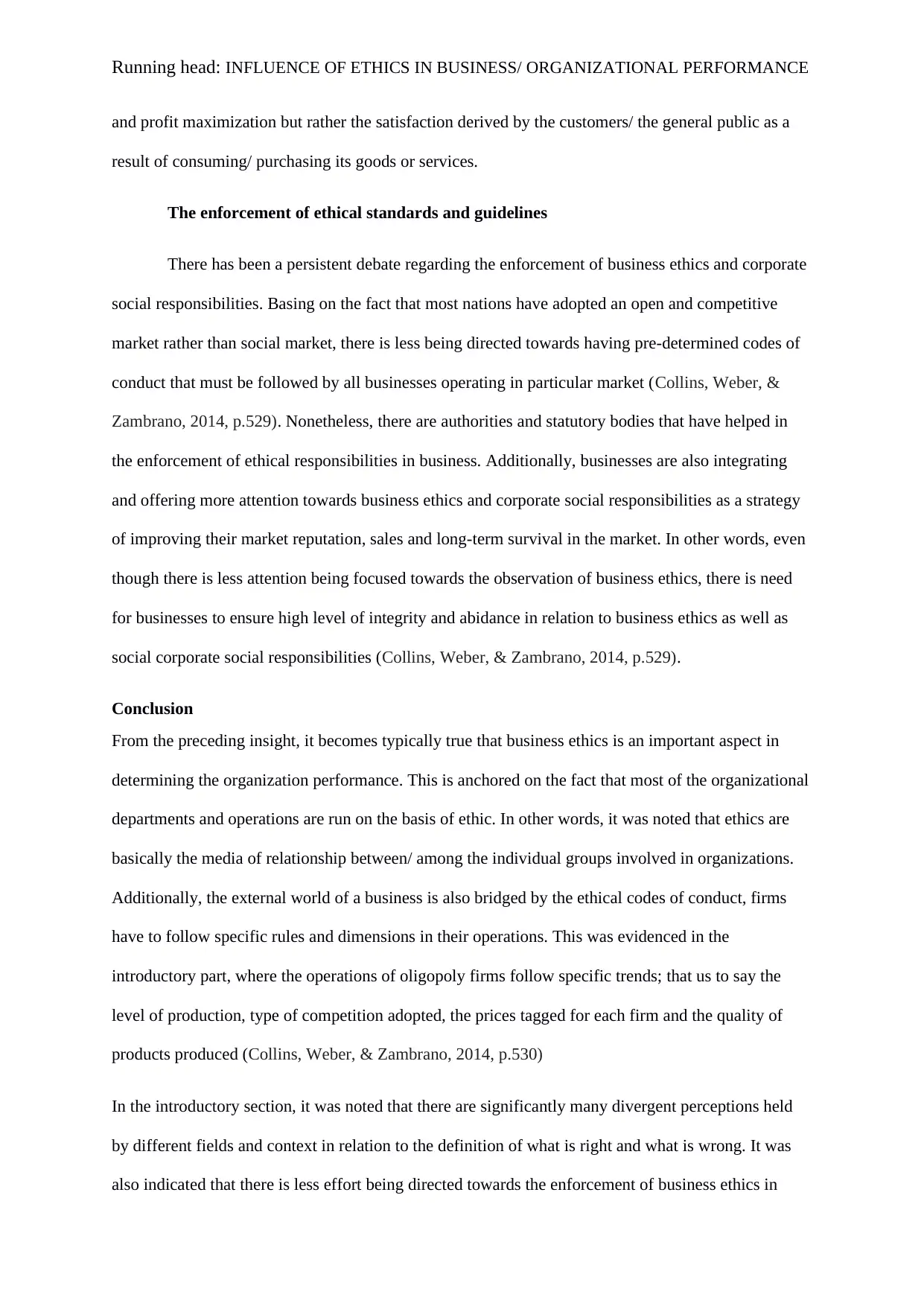
Running head: INFLUENCE OF ETHICS IN BUSINESS/ ORGANIZATIONAL PERFORMANCE
and profit maximization but rather the satisfaction derived by the customers/ the general public as a
result of consuming/ purchasing its goods or services.
The enforcement of ethical standards and guidelines
There has been a persistent debate regarding the enforcement of business ethics and corporate
social responsibilities. Basing on the fact that most nations have adopted an open and competitive
market rather than social market, there is less being directed towards having pre-determined codes of
conduct that must be followed by all businesses operating in particular market (Collins, Weber, &
Zambrano, 2014, p.529). Nonetheless, there are authorities and statutory bodies that have helped in
the enforcement of ethical responsibilities in business. Additionally, businesses are also integrating
and offering more attention towards business ethics and corporate social responsibilities as a strategy
of improving their market reputation, sales and long-term survival in the market. In other words, even
though there is less attention being focused towards the observation of business ethics, there is need
for businesses to ensure high level of integrity and abidance in relation to business ethics as well as
social corporate social responsibilities (Collins, Weber, & Zambrano, 2014, p.529).
Conclusion
From the preceding insight, it becomes typically true that business ethics is an important aspect in
determining the organization performance. This is anchored on the fact that most of the organizational
departments and operations are run on the basis of ethic. In other words, it was noted that ethics are
basically the media of relationship between/ among the individual groups involved in organizations.
Additionally, the external world of a business is also bridged by the ethical codes of conduct, firms
have to follow specific rules and dimensions in their operations. This was evidenced in the
introductory part, where the operations of oligopoly firms follow specific trends; that us to say the
level of production, type of competition adopted, the prices tagged for each firm and the quality of
products produced (Collins, Weber, & Zambrano, 2014, p.530)
In the introductory section, it was noted that there are significantly many divergent perceptions held
by different fields and context in relation to the definition of what is right and what is wrong. It was
also indicated that there is less effort being directed towards the enforcement of business ethics in
and profit maximization but rather the satisfaction derived by the customers/ the general public as a
result of consuming/ purchasing its goods or services.
The enforcement of ethical standards and guidelines
There has been a persistent debate regarding the enforcement of business ethics and corporate
social responsibilities. Basing on the fact that most nations have adopted an open and competitive
market rather than social market, there is less being directed towards having pre-determined codes of
conduct that must be followed by all businesses operating in particular market (Collins, Weber, &
Zambrano, 2014, p.529). Nonetheless, there are authorities and statutory bodies that have helped in
the enforcement of ethical responsibilities in business. Additionally, businesses are also integrating
and offering more attention towards business ethics and corporate social responsibilities as a strategy
of improving their market reputation, sales and long-term survival in the market. In other words, even
though there is less attention being focused towards the observation of business ethics, there is need
for businesses to ensure high level of integrity and abidance in relation to business ethics as well as
social corporate social responsibilities (Collins, Weber, & Zambrano, 2014, p.529).
Conclusion
From the preceding insight, it becomes typically true that business ethics is an important aspect in
determining the organization performance. This is anchored on the fact that most of the organizational
departments and operations are run on the basis of ethic. In other words, it was noted that ethics are
basically the media of relationship between/ among the individual groups involved in organizations.
Additionally, the external world of a business is also bridged by the ethical codes of conduct, firms
have to follow specific rules and dimensions in their operations. This was evidenced in the
introductory part, where the operations of oligopoly firms follow specific trends; that us to say the
level of production, type of competition adopted, the prices tagged for each firm and the quality of
products produced (Collins, Weber, & Zambrano, 2014, p.530)
In the introductory section, it was noted that there are significantly many divergent perceptions held
by different fields and context in relation to the definition of what is right and what is wrong. It was
also indicated that there is less effort being directed towards the enforcement of business ethics in
⊘ This is a preview!⊘
Do you want full access?
Subscribe today to unlock all pages.

Trusted by 1+ million students worldwide
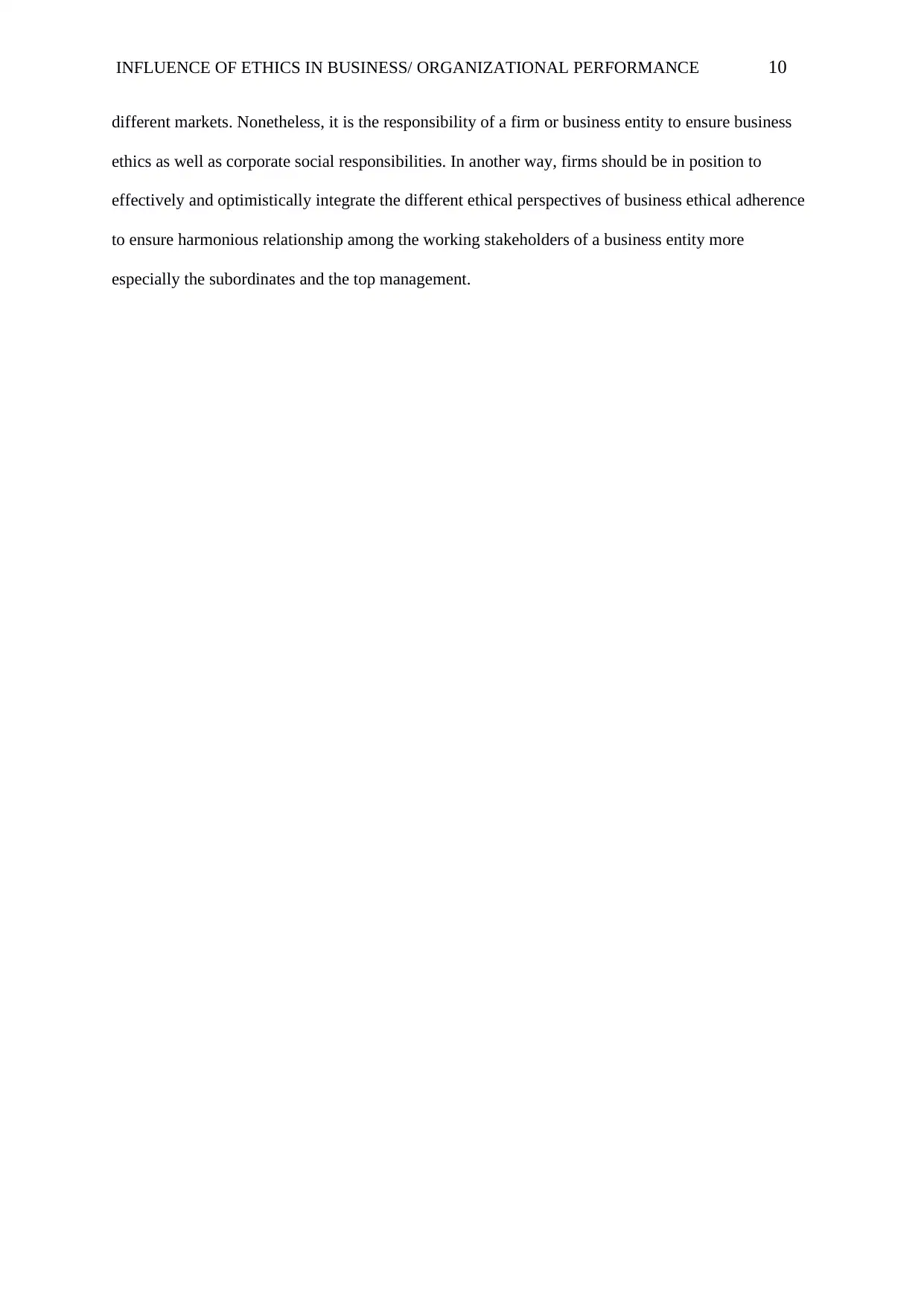
INFLUENCE OF ETHICS IN BUSINESS/ ORGANIZATIONAL PERFORMANCE 10
different markets. Nonetheless, it is the responsibility of a firm or business entity to ensure business
ethics as well as corporate social responsibilities. In another way, firms should be in position to
effectively and optimistically integrate the different ethical perspectives of business ethical adherence
to ensure harmonious relationship among the working stakeholders of a business entity more
especially the subordinates and the top management.
different markets. Nonetheless, it is the responsibility of a firm or business entity to ensure business
ethics as well as corporate social responsibilities. In another way, firms should be in position to
effectively and optimistically integrate the different ethical perspectives of business ethical adherence
to ensure harmonious relationship among the working stakeholders of a business entity more
especially the subordinates and the top management.
Paraphrase This Document
Need a fresh take? Get an instant paraphrase of this document with our AI Paraphraser
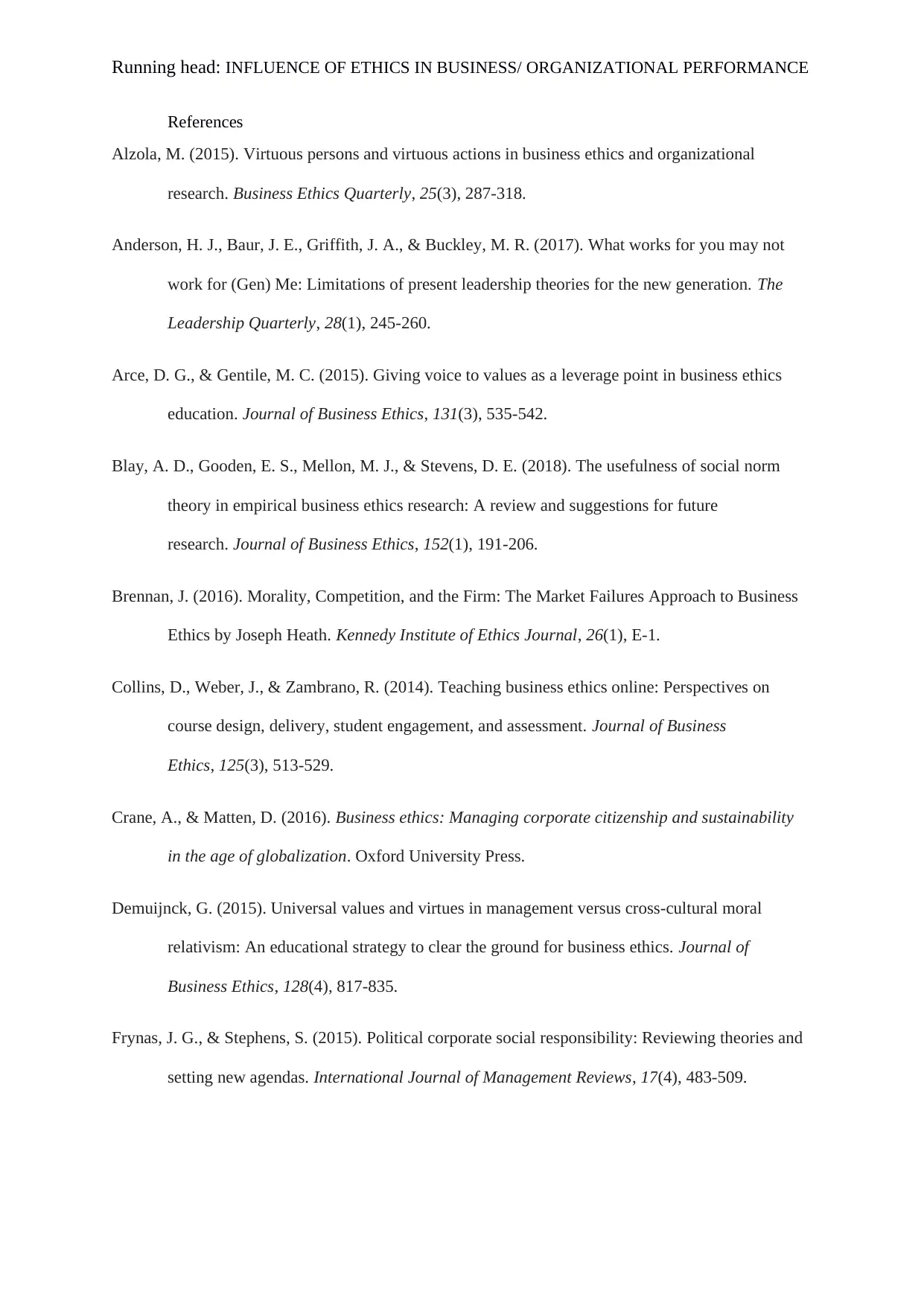
Running head: INFLUENCE OF ETHICS IN BUSINESS/ ORGANIZATIONAL PERFORMANCE
References
Alzola, M. (2015). Virtuous persons and virtuous actions in business ethics and organizational
research. Business Ethics Quarterly, 25(3), 287-318.
Anderson, H. J., Baur, J. E., Griffith, J. A., & Buckley, M. R. (2017). What works for you may not
work for (Gen) Me: Limitations of present leadership theories for the new generation. The
Leadership Quarterly, 28(1), 245-260.
Arce, D. G., & Gentile, M. C. (2015). Giving voice to values as a leverage point in business ethics
education. Journal of Business Ethics, 131(3), 535-542.
Blay, A. D., Gooden, E. S., Mellon, M. J., & Stevens, D. E. (2018). The usefulness of social norm
theory in empirical business ethics research: A review and suggestions for future
research. Journal of Business Ethics, 152(1), 191-206.
Brennan, J. (2016). Morality, Competition, and the Firm: The Market Failures Approach to Business
Ethics by Joseph Heath. Kennedy Institute of Ethics Journal, 26(1), E-1.
Collins, D., Weber, J., & Zambrano, R. (2014). Teaching business ethics online: Perspectives on
course design, delivery, student engagement, and assessment. Journal of Business
Ethics, 125(3), 513-529.
Crane, A., & Matten, D. (2016). Business ethics: Managing corporate citizenship and sustainability
in the age of globalization. Oxford University Press.
Demuijnck, G. (2015). Universal values and virtues in management versus cross-cultural moral
relativism: An educational strategy to clear the ground for business ethics. Journal of
Business Ethics, 128(4), 817-835.
Frynas, J. G., & Stephens, S. (2015). Political corporate social responsibility: Reviewing theories and
setting new agendas. International Journal of Management Reviews, 17(4), 483-509.
References
Alzola, M. (2015). Virtuous persons and virtuous actions in business ethics and organizational
research. Business Ethics Quarterly, 25(3), 287-318.
Anderson, H. J., Baur, J. E., Griffith, J. A., & Buckley, M. R. (2017). What works for you may not
work for (Gen) Me: Limitations of present leadership theories for the new generation. The
Leadership Quarterly, 28(1), 245-260.
Arce, D. G., & Gentile, M. C. (2015). Giving voice to values as a leverage point in business ethics
education. Journal of Business Ethics, 131(3), 535-542.
Blay, A. D., Gooden, E. S., Mellon, M. J., & Stevens, D. E. (2018). The usefulness of social norm
theory in empirical business ethics research: A review and suggestions for future
research. Journal of Business Ethics, 152(1), 191-206.
Brennan, J. (2016). Morality, Competition, and the Firm: The Market Failures Approach to Business
Ethics by Joseph Heath. Kennedy Institute of Ethics Journal, 26(1), E-1.
Collins, D., Weber, J., & Zambrano, R. (2014). Teaching business ethics online: Perspectives on
course design, delivery, student engagement, and assessment. Journal of Business
Ethics, 125(3), 513-529.
Crane, A., & Matten, D. (2016). Business ethics: Managing corporate citizenship and sustainability
in the age of globalization. Oxford University Press.
Demuijnck, G. (2015). Universal values and virtues in management versus cross-cultural moral
relativism: An educational strategy to clear the ground for business ethics. Journal of
Business Ethics, 128(4), 817-835.
Frynas, J. G., & Stephens, S. (2015). Political corporate social responsibility: Reviewing theories and
setting new agendas. International Journal of Management Reviews, 17(4), 483-509.
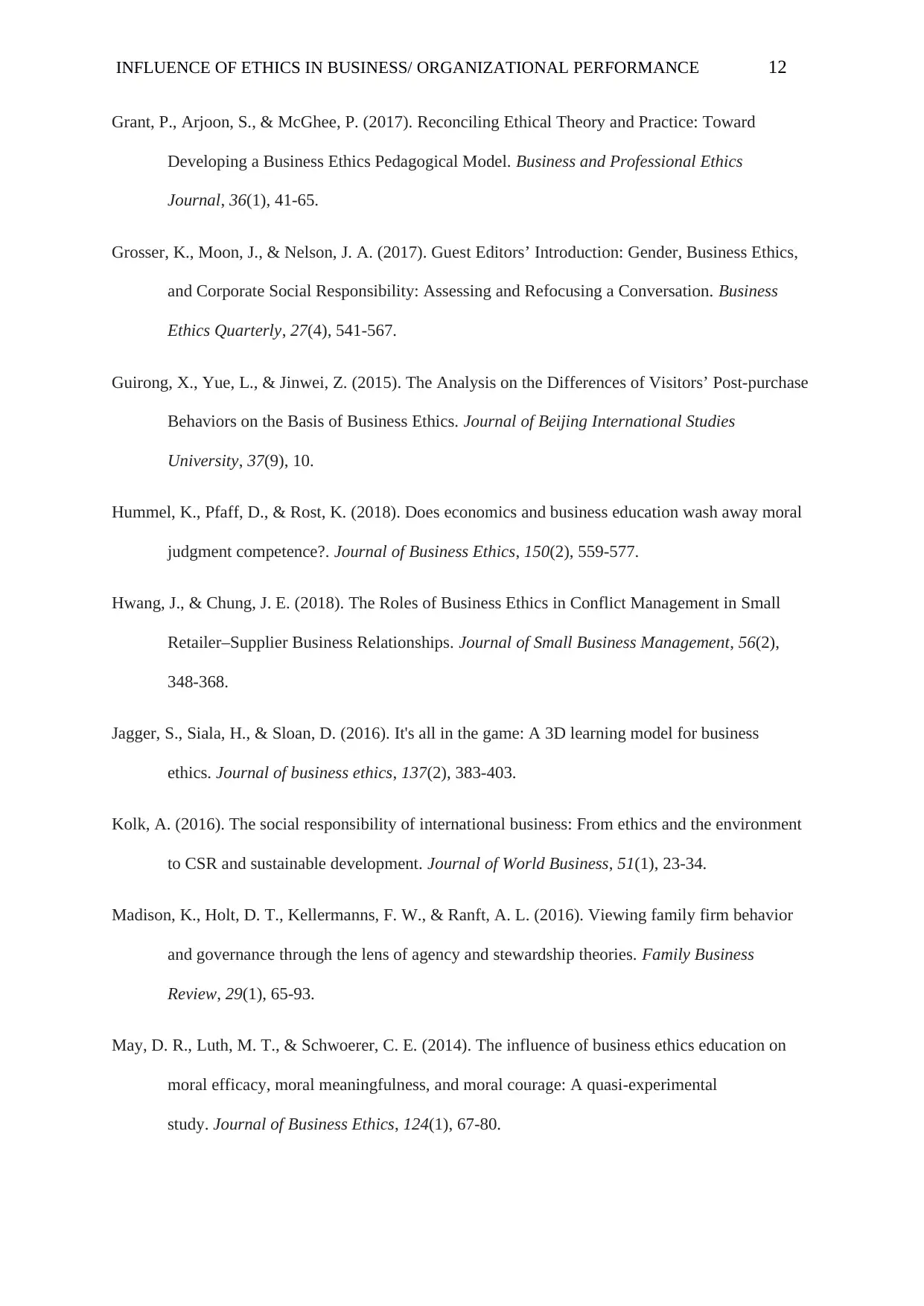
INFLUENCE OF ETHICS IN BUSINESS/ ORGANIZATIONAL PERFORMANCE 12
Grant, P., Arjoon, S., & McGhee, P. (2017). Reconciling Ethical Theory and Practice: Toward
Developing a Business Ethics Pedagogical Model. Business and Professional Ethics
Journal, 36(1), 41-65.
Grosser, K., Moon, J., & Nelson, J. A. (2017). Guest Editors’ Introduction: Gender, Business Ethics,
and Corporate Social Responsibility: Assessing and Refocusing a Conversation. Business
Ethics Quarterly, 27(4), 541-567.
Guirong, X., Yue, L., & Jinwei, Z. (2015). The Analysis on the Differences of Visitors’ Post-purchase
Behaviors on the Basis of Business Ethics. Journal of Beijing International Studies
University, 37(9), 10.
Hummel, K., Pfaff, D., & Rost, K. (2018). Does economics and business education wash away moral
judgment competence?. Journal of Business Ethics, 150(2), 559-577.
Hwang, J., & Chung, J. E. (2018). The Roles of Business Ethics in Conflict Management in Small
Retailer–Supplier Business Relationships. Journal of Small Business Management, 56(2),
348-368.
Jagger, S., Siala, H., & Sloan, D. (2016). It's all in the game: A 3D learning model for business
ethics. Journal of business ethics, 137(2), 383-403.
Kolk, A. (2016). The social responsibility of international business: From ethics and the environment
to CSR and sustainable development. Journal of World Business, 51(1), 23-34.
Madison, K., Holt, D. T., Kellermanns, F. W., & Ranft, A. L. (2016). Viewing family firm behavior
and governance through the lens of agency and stewardship theories. Family Business
Review, 29(1), 65-93.
May, D. R., Luth, M. T., & Schwoerer, C. E. (2014). The influence of business ethics education on
moral efficacy, moral meaningfulness, and moral courage: A quasi-experimental
study. Journal of Business Ethics, 124(1), 67-80.
Grant, P., Arjoon, S., & McGhee, P. (2017). Reconciling Ethical Theory and Practice: Toward
Developing a Business Ethics Pedagogical Model. Business and Professional Ethics
Journal, 36(1), 41-65.
Grosser, K., Moon, J., & Nelson, J. A. (2017). Guest Editors’ Introduction: Gender, Business Ethics,
and Corporate Social Responsibility: Assessing and Refocusing a Conversation. Business
Ethics Quarterly, 27(4), 541-567.
Guirong, X., Yue, L., & Jinwei, Z. (2015). The Analysis on the Differences of Visitors’ Post-purchase
Behaviors on the Basis of Business Ethics. Journal of Beijing International Studies
University, 37(9), 10.
Hummel, K., Pfaff, D., & Rost, K. (2018). Does economics and business education wash away moral
judgment competence?. Journal of Business Ethics, 150(2), 559-577.
Hwang, J., & Chung, J. E. (2018). The Roles of Business Ethics in Conflict Management in Small
Retailer–Supplier Business Relationships. Journal of Small Business Management, 56(2),
348-368.
Jagger, S., Siala, H., & Sloan, D. (2016). It's all in the game: A 3D learning model for business
ethics. Journal of business ethics, 137(2), 383-403.
Kolk, A. (2016). The social responsibility of international business: From ethics and the environment
to CSR and sustainable development. Journal of World Business, 51(1), 23-34.
Madison, K., Holt, D. T., Kellermanns, F. W., & Ranft, A. L. (2016). Viewing family firm behavior
and governance through the lens of agency and stewardship theories. Family Business
Review, 29(1), 65-93.
May, D. R., Luth, M. T., & Schwoerer, C. E. (2014). The influence of business ethics education on
moral efficacy, moral meaningfulness, and moral courage: A quasi-experimental
study. Journal of Business Ethics, 124(1), 67-80.
⊘ This is a preview!⊘
Do you want full access?
Subscribe today to unlock all pages.

Trusted by 1+ million students worldwide
1 out of 14
Related Documents
Your All-in-One AI-Powered Toolkit for Academic Success.
+13062052269
info@desklib.com
Available 24*7 on WhatsApp / Email
![[object Object]](/_next/static/media/star-bottom.7253800d.svg)
Unlock your academic potential
Copyright © 2020–2026 A2Z Services. All Rights Reserved. Developed and managed by ZUCOL.





